This year, the first-ever UChicagoGRAD Diversity Advisory Board (DAB) Awards were granted to individuals who have made exceptional contributions to diversity and inclusion efforts at the University of Chicago.
Sponsored by Graduate Council, the DAB Awards are designed to recognize a student from each academic unit. Conferring these accolades, said Diversity Advisory Board member Victoria Okuneye, is especially important as a matter of fairness.
“These awards honor students for work that doesn’t normally have a clear reward or recognition, or that is not recognized through the regular channels,” said Okuneye, a medical and doctoral student who joined DAB in 2018. “[This] work is not always equally distributed. We wanted to honor individuals who have been exemplary in their academic units, and to hopefully inspire others to follow suit.”
DAB selected 12 winners from over 70 nominations. While graduate students were nominated for a variety of activities and efforts, Okuneye noted some common themes: “Many winners are doing community education, organizing working with younger people, and working within departments.”
“We wanted to honor individuals who have been exemplary in their academic units, and to hopefully inspire others to follow suit.”
The DAB Awards reflect the University’s efforts to foster a more diverse and inclusive environment and build on the Diversity Leadership Awards, which this year began recognizing students in addition to faculty, staff, and alumni.
Dana Bozeman, who directs GRAD Diversity & Inclusion and advises DAB, credited the board’s two-year effort to push for funding and recognition for graduate students. Bozeman highlighted the work of Derek Nettingham, former communications chair for DAB, and Nova Smith, former programming chair, who together co-chaired DAB’s executive board during the selection process. “Tireless work of the DAB board made this happen,” Bozeman said of the awards.
“Recognizing the impactful efforts of students, who are making vital contributions in this area, is an important way we can acknowledge and reward those who are central in helping the University become and remain the welcoming, diverse, and inclusive institution that we aspire to be,” said Vice Provost Jason Merchant, who oversees graduate education.
In addition to celebrating the work of individuals across academic units, the DAB Awards program provides a community for underrepresented student leaders to learn from each other, share challenging issues facing their respective units, and work toward solutions.
Okuneye hopes the awards can also function as a recruitment tool. “The awards are a way of telling prospective graduate students that diverse graduate students are here,” she said. “Look for them, read about their works, and join our graduate community.”
Four graduate students received specialty awards honoring their efforts, and eight other winners represented their schools and divisions. Read below for information on the winners. For anyone interested in becoming a part of DAB or wishing to offer suggestions for future DAB awards, please contact Dana Bozeman.
Specialty Awards

The In Dialogue Award recognizes a University of Chicago conference, talk, workshop, or community-building activity organized primarily by a student, groups of students, or students in collaboration with faculty. The event must have centered social justice issues facing individuals on or off campus.
This year’s winner is Justin Douglas, a graduate of the joint social work and public policy master's program at the Crown Family School of Social Work, Policy, and Practice and the Harris School of Public Policy. As part of the Graduate Council, he previously served as both co-president and vice president of diversity. There, Douglas established a committee to help connect the UChicago community to campus diversity and inclusion efforts and instituted the Diversity Roundtable series, giving student leaders the opportunity to interface with top-level administrators about issues ranging from cultural houses to campus police reform.
This past year, Douglas founded the Black Grad Coalition, which provides a space for Black graduate students to connect and build community through regular meetings, service projects, and advocacy initiatives.
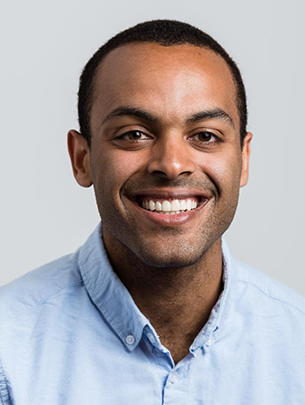
The Outstanding First-year Award recognizes first-year graduate students who have engaged with diversity-based campus opportunities in a meaningful way. This year’s winner is Frazer Tessema of the Pritzker School of Medicine.
As a medical student, Tessema has worked to improve care for sickle cell trait and disease. Tessema examines the literature of the trait’s impact on traumas and how legal discrimination faced by Black patients resulted in failure to nationally mandate trait screening until 2006, stifling research and impacting care today.
This past year, Tessema organized a screening of Judas and the Black Messiah and moderated a discussion with Rep. Bobby Rush, a former Black Panther, about the legacy of Fred Hampton, the former chair of the Black Panther Party’s Illinois chapter. Tessema is co-leader of the Internal Medicine and Health Policy Interest Groups, co-editor of the Pritzker Health Policy Review, and innovation fund manager for the Chicagoland Free Clinics Consortium.
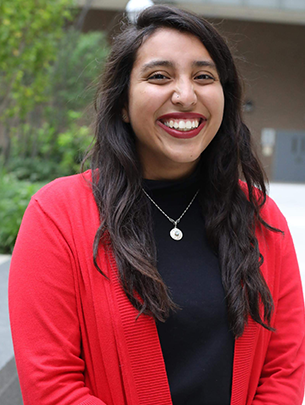
The Mary S. Debose Outstanding Advocate Award recognizes an individual who exhibits their own personal form of dedicated advocacy in a particular area related to social justice. It is named for Debose, a grassroots community advocate and activist specializing in adoptee rights in the greater Chicago area since 1978. This year’s winner is Itzel López-Hinojosa of the Pritzker School of Medicine.
Growing up with two Mexican immigrant parents, López-Hinojosa saw how difficult it was for them to navigate everyday issues such as health care. As a medical student, López-Hinojosa was an Albert Schweitzer fellow and co-president of the Latino Medical Student Association (LMSA), where she co-organized the annual Black and Latina Women in Medicine Forum and the annual regional LMSA conference to further engage with health care disparities issues affecting the Latinx community.
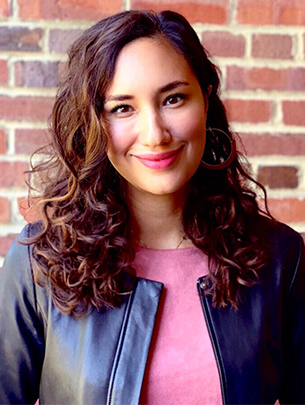
The Georgiana Simpson Research Award is named after the University of Chicago alum who was the first African American woman to earn a Ph.D. in the United States. The award highlights scholarly work which critically looks at the current status of diversity in their given context. This year’s winner is Margaret Teresa Brower of the Department of Political Science.
Brower’s doctoral research investigates the experiences of people of color, especially women of color, to identify lawmaking and policies that better serve and represent their interests. Her scholarship with Cornell University’s Jamila Michener on the pandemic’s disproportionate negative impact on economic conditions for Black and Latina women in the workforce was featured in the Washington Post, MSNBC Live and NPR. She is currently researching how policymaking can better adapt to the intersectional experiences of women of color. She received grant awards from the Center for American Women and Politics, the Pozen Family Center for Human Rights, and the Women in Politics Centennial Center for Political Science.
Divisional/School
Pritzker School of Medicine

Akosua Oppong has organized programming to help Black medical students connect with Black residents and attendings at UChicago Medicine. She was co-vice president of the Student National Medical Association (SNMA); acted as a student interviewer for Pritzker, advocating for students from backgrounds that are underrepresented in medicine; and was part of a committee that worked to create a bias reporting system across the medical school and medical center.
As a part of the Health Professions Recruitment and Exposure Program (HPREP), Oppong helped to recruit high school students from the South and West sides of Chicago to HPREP’s 15th annual program. She was co-director of Washington Park Free Clinic.
Booth School of Business
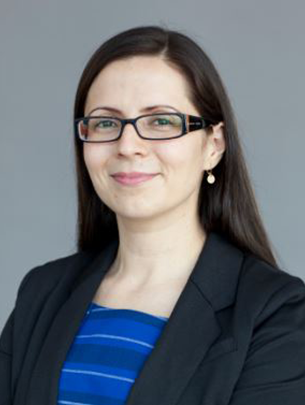
Gabriela Arismendi is a student in the evening/weekend MBA program at Booth as a Neubauer Civic Scholar. She is the daughter of Mexican immigrants and the first generation in her family to go to college. Arismendi has served as a co-chair for the Coalition of Minorities in Business.
She also organized the University of Chicago Hearing One Another and Inclusion in Practice workshops for Booth evening and weekend students. Arismendi is a founding Diversity, Equity, and Inclusion board member of Booth’s Student Advisory Council, and was selected as a Net Impact Racial Equity Fellow to represent Booth at the national Net Impact Conference.
Crown Family School of Social Work, Policy, and Practice
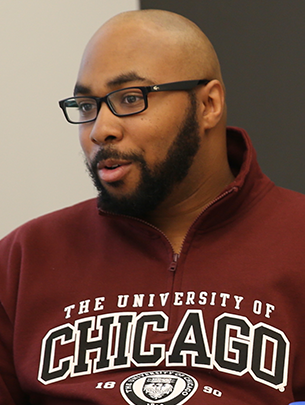
TJ Harper was the recent student government president at the Crown Family School. In this role, Harper made strides to increase mentoring opportunities for students of color and create specialized workshops with alumni of color.
Harper has also had conversations with the administration about curriculum changes that include critical race theory and about recruiting more faculty of color. He has been a liaison between students of color and faculty when there were allegations of racism and racialized microaggressions, helping both parties to work toward a mutual understanding of the harm that students felt. During the pandemic, Harper launched a student government initiative creating an emergency fund for Crown students.
Harris School of Public Policy
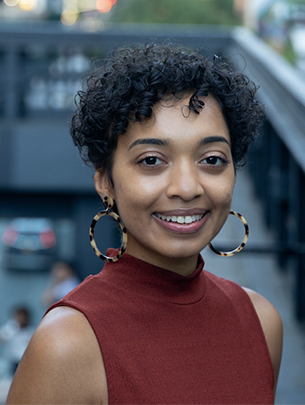
Alysha Rashid is a recent graduate of Harris, where she was a graduate assistant in the Office of Diversity and Inclusion.
She was also a board member for the student organizations Black Action for Public Policy Studies and Minorities in Public Policy Studies.
In the wake of the Black Lives Matter protests in the late spring of 2020, she collaborated with the Black community at Harris to send a letter to the administration speaking to issues that Black people face at Harris. She worked to bring on first-year students to carry on the work of pursuing those recommendations and demands.
Biological Sciences Division

Mat Perez-Neut is a Ph.D. candidate in the Committee on Cancer Biology. He was a peer mentor for the National Cancer Institute-supported Chicago EYES (Educators and Youth Enjoy Science) and has mentored students through the National Institutes of Health Initiative for Maximizing Student Development.
He was co-president of the UChicago chapter of the Society for the Advancement of Chicanos and Native Americans in Science (SACNAS) and co-founded the Graduate Recruitment Initiative Team (GRIT) to focus on sustainably improving the recruitment and retention of marginalized groups in STEM, resulting in 44% of admitted underrepresented minority students being actively recruited by GRIT in 2017, and in 81% in 2018.
Social Sciences Division
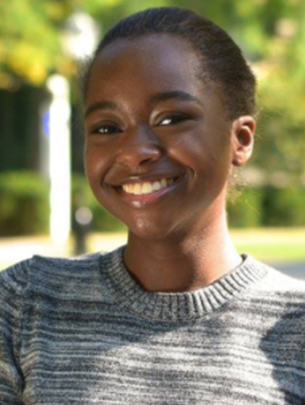
Jharnae Love is a Ph.D. student at the Institute of Mind and Biology, where she is one of the only BIPOC scientists in 10 research labs and willingly takes an active role in educating her peers through conversation and disseminating materials on how to build an “anti-racist lab.”
Love is one of the only BIPOC students in her program and hopes that changes prior to her graduation. To help drive this change, she took on a role as prospective student weekend coordinator and engaged with other opportunities focused on recruiting prospective students to the university. She is also involved with organizations including Black in Academia and Black Grad Coalition.
Divinity School

Matt Vega, a Hanna Holborn Gray Fellow at the Divinity School, organizes initiatives around racial, gender and class justice. Vega co-designed an abolition reading group that brought together faculty, students, and community members to think critically about the relationship between prisons and justice; that group transformed into the Racial Capitalism Reading Group.
While a leader of the Theology Club, he co-organized events on liberation theologians in the United States and Latin America, generating public interest around the relationship between race, class, and religion. Vega also helped moderate the event Freedom Dreams, organized with UChicago Spiritual Life and the Office of Multicultural Student Affairs.
Physical Sciences Division

Haynes Stephens participates in the equity, diversity and inclusion (EDI) peer mentoring program for underrepresented students in the Physical Sciences Division (PSD), and currently supports two mentees. He regularly meets with PSD leadership to share student insight on topics related to EDI.
Within the Department of the Geophysical Sciences, Haynes is a member of the EDI Coordination Team and has worked with the Graduate Recruitment Initiative Team (GRIT) on department-level recruitment efforts. He served as a panelist on the UChicago Black History Month Student Panel and is a member of the UChicago Black Grad Coalition.





